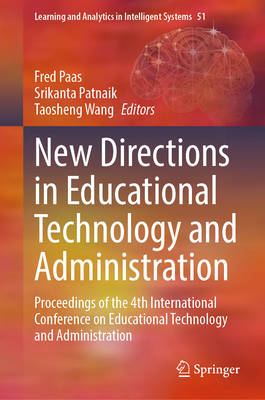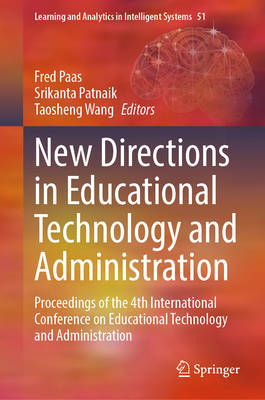
Bedankt voor het vertrouwen het afgelopen jaar! Om jou te bedanken bieden we GRATIS verzending (in België) aan op alles gedurende de hele maand januari.
- Afhalen na 1 uur in een winkel met voorraad
- In januari gratis thuislevering in België
- Ruim aanbod met 7 miljoen producten
Bedankt voor het vertrouwen het afgelopen jaar! Om jou te bedanken bieden we GRATIS verzending (in België) aan op alles gedurende de hele maand januari.
- Afhalen na 1 uur in een winkel met voorraad
- In januari gratis thuislevering in België
- Ruim aanbod met 7 miljoen producten
Zoeken
New Directions in Educational Technology and Administration
Proceedings of the 4th International Conference on Educational Technology and Administration
€ 335,95
+ 671 punten
Omschrijving
"New Directions in Educational Technology and Administration" emphasize the integration of cutting-edge tools like artificial intelligence, big data, and augmented reality to enhance teaching and learning experiences. This volume focus on creating more personalized, accessible, and equitable education systems that cater to diverse learners. At the same time, administrative innovations prioritize data-driven decision-making and streamlined operations to foster efficient institutional management. This volume also explores the most recent innovations and significant developments in the domain of Educational Technology and Administration, offering a thorough overview of the current landscape. It encompasses various dimensions including: Learning Analytics and Curriculum Design Online and Distance Learning Leadership in Modern Education By merging theoretical knowledge with practical applications, this book empowers educators, researchers, practitioners, and students to navigate and excel with the New Directions in Educational Technology and Administration with a focus on responsible technology for assessment and feedback, the book address challenges like digital equity and ethical implementation. By embracing these new directions, the education sector is poised to redefine learning environments and empower future generations.
Specificaties
Betrokkenen
- Uitgeverij:
Inhoud
- Aantal bladzijden:
- 333
- Taal:
- Engels
- Reeks:
- Reeksnummer:
- nr. 51
Eigenschappen
- Productcode (EAN):
- 9783031952517
- Verschijningsdatum:
- 15/07/2025
- Uitvoering:
- Hardcover
- Formaat:
- Genaaid
- Afmetingen:
- 156 mm x 234 mm
- Gewicht:
- 675 g

Alleen bij Standaard Boekhandel
+ 671 punten op je klantenkaart van Standaard Boekhandel
Beoordelingen
We publiceren alleen reviews die voldoen aan de voorwaarden voor reviews. Bekijk onze voorwaarden voor reviews.








